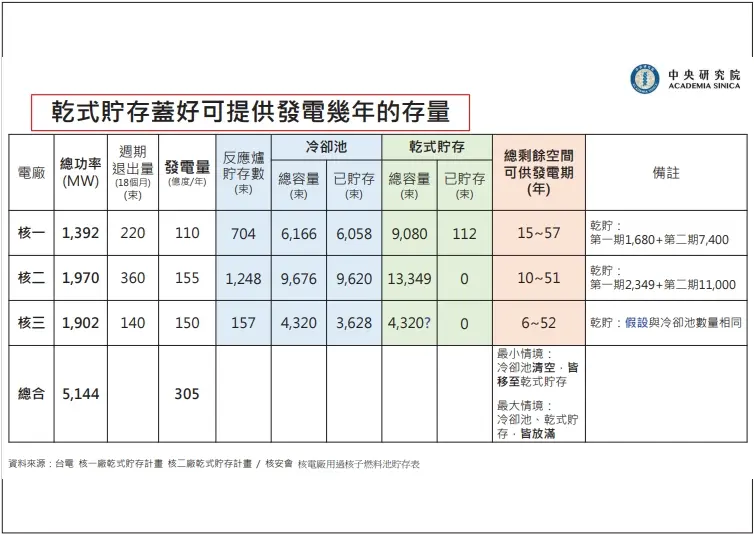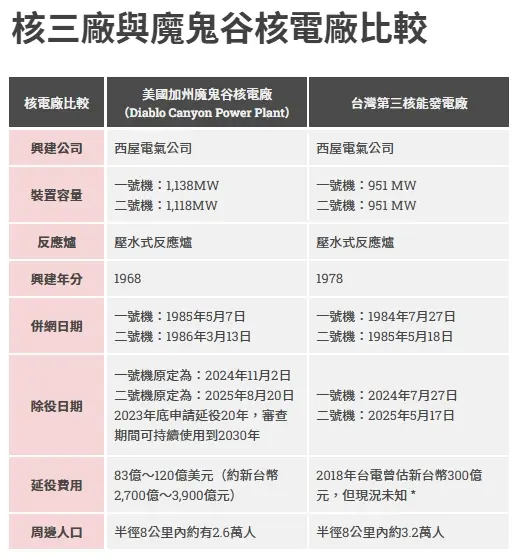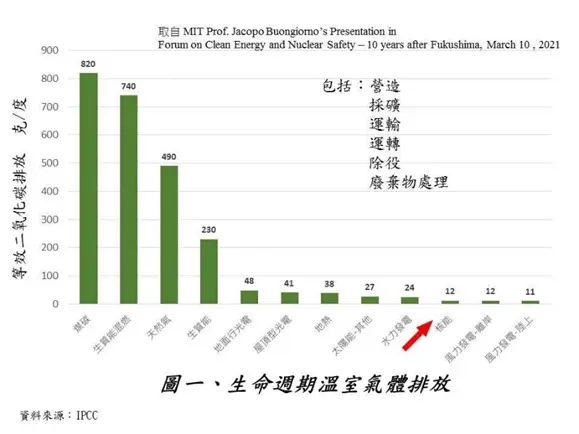Legislative Acts
Nuclear Act Reform Section
Third Reading Provisions
The Legislative Yuan passed the third reading and amendment of Article 6 of the Control Act for Nuclear Reactor Facilities on May 13, 2025.
Article 6
After the construction of a nuclear reactor facility is completed, nuclear fuel shall not be loaded unless the competent authority has reviewed and approved the Final Safety Analysis Report, the results of inspections and improvements during construction, and the passing of system functional tests. After nuclear fuel is loaded, the reactor may not enter formal operation unless the competent authority has reviewed and approved the power test results and issued an operating license.
The term of validity for the aforementioned operating license shall not exceed forty years. If continued operation is required after expiration, the operator may apply to the competent authority for license renewal prior to expiration. Operation may not continue without proper license renewal.
If continued operation is necessary after the term of an operating license expires, the operator may apply to the competent authority. Only after the competent authority has confirmed there are no safety concerns and approved license renewal may continued operation be permitted.
The issuance and renewal of operating licenses shall be governed by the provisions of Paragraph 1 of the preceding Article. The renewed operating license shall be valid for a period not exceeding twenty years, starting from the date the license takes effect. The required documentation for applications, review procedures, and other compliance matters shall be stipulated by the competent authority.
Control Act for Nuclear Reactor Facilities - LawTrace
Why Amend the Nuclear Reactor Facilities Regulation Act?
Under the old regulations, nuclear power plants seeking license renewal for extended operation had to apply 5–15 years before the license expiration. Furthermore, there were absolutely no provisions for how already-shutdown reactors could resume operation. Therefore, if the “Nuclear Reactor Facilities Regulation Act” is not amended, after the shutdown of Nuclear Power Plant No. 3, Unit 2 (scheduled for 2025/05/17), Taiwan’s main electricity sources will be limited to high-carbon thermal power, as well as costly and unstable wind and solar power. This would severely impact economic, industrial, and commercial development.
Such an energy structure not only goes against the global trend of carbon reduction, but also endangers public health, increases national electricity costs, leading to higher electricity prices or losses for Taipower, and threatens national security.
What Does the Amendment Involve?
To allow the government greater flexibility in adjusting energy policy, we have revised Article 6 of the “Nuclear Reactor Facilities Regulation Act”.
In the second paragraph, the new version relaxes the time limit for license renewal applications, deleting the previous requirement for applications to be submitted 5–15 years before license expiration and instead allowing applications to be submitted at any time before the license expires. This gives the soon-to-be-closed Nuclear Power Plant No. 3, Unit 2 the opportunity to apply.
A new third paragraph has been added to address the issue that already-shutdown reactors could not be restarted at all. In the future, if a reactor’s operating license has expired and the administrative authority deems it necessary for the reactor to resume operation, the operator (Taipower) can apply to the relevant authority (Nuclear Safety Commission) for a renewed license. Only after the authority confirms there are no safety concerns and approves all related documentation can the reactor resume operation.
The fourth paragraph, in its new version, adds regulations setting the maximum period for renewed licenses, stipulating that it shall not exceed twenty years.
Summary of the Amendment
This amendment does not in any way force the government to keep nuclear plants running. Extending the service life or restarting a nuclear power plant still requires passing the following five hurdles:
- The administrative authority determines there is a “need.”
- The operator (Taipower) “submits” a renewal application to the relevant authority (Nuclear Safety Commission).
- The relevant authority (Nuclear Safety Commission) “confirms” there are no safety concerns.
- The relevant authority (Nuclear Safety Commission) “reviews” related reports and documentation.
- The relevant authority (Nuclear Safety Commission) “approves” the license renewal.
If any one of these stages encounters a problem, the plant cannot be extended or restarted. In other words, this is a rigorous review process that must pass five consecutive hurdles.
In short, this amendment merely addresses deficiencies in the old law, which completely excluded the possibilities of license extension or reactor restart, and gives the government more “options.” Whether Taiwan continues to include nuclear energy as a viable option will ultimately be determined by responsible policymakers.
Timeline
| Date | Proposer/Party | Event Description |
|---|---|---|
| 2012/05/18 | Taiwan Solidarity Union | Draft amendment to the Nuclear Reactor Facilities Control Act, first reading passed, sent to committee |
| 2012/09/18 | Chen Chieh-ju | Draft amendment to the Act, first reading passed, sent to committee |
| 2012/09/18 | Cheng Li-chun | Draft amendment to the Act, first reading passed, sent to committee |
| 2016/03/18 | Yao Wen-chih | Draft amendment to the Act, first reading passed, sent to committee |
| 2016/11/04 | Lu Sun-ling | Draft amendment to the Act, first reading passed, sent to committee |
| 2023/04/28 | Wu Yi-ting | Draft amendment to the Act, first reading passed, sent to committee |
| 2024/02/20 | Wang Hung-wei | Draft amendment to the Act, first reading passed, sent to committee |
| 2024/03/01 | Chiu Chen-chun | Draft amendment to the Act, first reading passed, sent to committee |
| 2024/03/15 | Su Ching-chuan | Draft amendment to the Act, first reading passed, sent to committee |
| 2024/05/03 | Weng Hsiao-ling | Draft amendment to the Act, first reading passed, sent to committee |
| 2024/07/10 | Ko Chih-en (Convener) | First committee review |
| 2024/07/12 | Taiwan People’s Party | Draft amendment to the Act, first reading passed, sent to committee |
| 2024/10/04 | Hsu Hsin-ying | Draft amendment to the Act, first reading passed, sent to committee |
| 2025/03/07 | Ko Ju-chun | Draft amendment to the Act, first reading passed, sent to committee |
| 2025/03/14 | Hsu Yu-chen | Draft amendment to the Act, first reading passed, sent to committee |
| 2025/03/14 | Yang Chiung-ying | Draft amendment to the Act, first reading passed, sent to committee |
| 2025/03/19 | Ko Ju-chun (Convener) | Public hearing on the Partial Amendments to the Nuclear Reactor Facilities Control Act |
| 2025/03/31 | Ko Ju-chun (Convener) | Second committee review |
| 2025/04/18 | Lin Ssu-ming | Draft amendment to the Act, sent directly to second reading |
| 2025/04/25 | Huang Chien-hao | Draft amendment to the Act, sent directly to second reading |
| 2025/04/25 | Wang Yu-min | Draft amendment to the Act, sent directly to second reading |
| 2025/04/25 | Hsu Chiao-hsin | Draft amendment to the Act, sent directly to second reading |
| 2025/05/09 | Chang Chia-chun | Draft amendment to the Act, sent directly to second reading |
| 2025/05/09 | President of Legislative Yuan | Convened party negotiations (fifth case), but due to repeated procedural statements by the DPP, substantive negotiations did not proceed |
| 2025/05/12 | Education and Culture Committee | Party negotiations reached no consensus, bill left for the full legislative session |
| 2025/05/13 | - | Third reading passed |
Public Hearing Summary
On March 19, 2025, the Legislative Yuan’s Education and Culture Committee held a public hearing to discuss issues such as amendments to nuclear-related regulations, the extension of nuclear power plant operations, and plant restarts. The meeting aimed to gather diverse opinions and seek consensus for Taiwan’s energy transition.
This public hearing focused on Taiwan’s energy transition and the amendment of the “Control Act for Nuclear Reactor Facilities,” discussing the feasibility of extending the operation or restarting nuclear plants, related policies, and societal views. The main topic was “Looking ahead to future technological development and realizing a non-carbon homeland to provide diversified energy options for Taiwan.” The convening committee emphasized the goal of establishing a rational discussion platform that integrates opinions from all sectors as a reference for future legislation.
Summary of Government Authorities’ Comments:
- Ministry of Justice: Pointed out that nuclear energy and energy policy involve major national interests and environmental safety; broad expert input and the broadest social consensus are needed.
- Ministry of Economic Affairs: Expressed respect for the legislature’s authority over legal amendments but emphasized adherence to existing laws and increased communication with society about nuclear waste disposal before any legal changes.
- Atomic Energy Council: Stated that it holds no pre-set stance on energy sources; if amendments pass, nuclear plants must conduct safety assessments, organizational restructuring, fuel management, and equipment updates as required. Only after passing rigorous reviews may they apply for license renewal and operation.
Major Arguments in Favor
- Electricity Stability and Economic Competitiveness: Stable and affordable electricity is considered vital for industry (especially high-tech and AI) and people’s livelihoods. Nuclear power offers a stable, economical, and clean electricity source.
- Energy Independence and Security: Taiwan’s energy system is heavily dependent on imports. Nuclear power can enhance energy security and mitigate supply risks related to international geopolitical challenges (e.g., natural gas).
- Net-Zero Emissions and Environmental Protection: Nuclear energy is viewed as a low-carbon, coal-free source that helps reduce air pollution. In contrast, wind and solar have their own environmental controversies.
- Technological Progress and Safety Management: Proponents argue that Taipower and the Atomic Energy Council have the professional capability to ensure safety management. Seismic assessments meet international standards, and new technologies (like SMRs) offer enhanced safety.
- International Trends: Many countries are restarting or extending the operation of nuclear plants; the U.S. even extends up to 80 years. There is an evident global trend toward a “nuclear renaissance.”
- Preserving Future Options: Suggests that laws should be in place in advance to retain policy flexibility in emergencies, even if nuclear power is not used in the short term.
- Local Resident Support: Many residents near nuclear power plants support continued operation, seeing it as a driver for local economic development.
Major Arguments Against
- Safety Concerns: Critics question the safety of aging reactors and equipment, seeing increased nuclear accident risk. Taiwan is on a seismic belt with active faults near plants; some equipment (like steam generators) is prone to malfunction.
- Nuclear Waste Disposal Challenges: Emphasizes that there is still no final repository solution for high-level radioactive waste, and interim storage is progressing slowly—extension would only increase the burden for future generations.
- Regulatory and Administrative Barriers: Current regulations require advance license renewal, and some units have already entered the decommissioning phase. Amending the law could conflict with existing decommissioning plans.
- Inadequate Emergency Preparedness: Existing emergency response zones are too small. If expanded to international standards, evacuation and sheltering large populations may be unfeasible.
- Talent Gap: There is a gap in the training of nuclear engineers; a shortage of specialized personnel may not meet future needs.
- Advocacy for Continued Energy Transition: It is argued that Taiwan should continue reducing coal, increasing gas, and developing renewables. Renewable energy progresses faster than nuclear, with fewer safety and waste issues, and an accelerated grid upgrade is necessary.
- Unresolved Social Controversy: Nuclear energy is a source of ideological division and lacks substantial societal dialogue and consensus.
- Questioning Global Nuclear Trends: Some believe the share of nuclear energy worldwide is steadily declining, and most countries are turning to renewables rather than nuclear.
Nuclear Power Life Extension Q&A
Q: Where will nuclear waste be stored?
A: Reports from Academia Sinica and the Nuclear Safety Commission (NSC) clearly state that even if both units at the Maanshan Nuclear Power Plant (Nuclear Power Plant No. 3) operate at full capacity, the spent fuel pools at the plant can still store waste for another 4–5 years. Therefore, there will be no issue with “nowhere to store nuclear waste”.
Regarding the dry storage facilities at each plant:
- Nuclear Plant 1: The outdoor dry storage facility has already obtained an operating license, and the indoor facility is currently in the public bidding phase.
- Nuclear Plant 2: The outdoor dry storage facility is under construction, and the indoor facility is also in the public bidding phase.
- Nuclear Plant 3: The indoor dry storage facility will enter the public bidding phase within this year.
In other words, the nuclear waste storage issues at each power plant are being addressed steadily, contrary to what the DPP claims.

Q: Taiwan does not yet have a permanent nuclear waste storage site. What will we do in the future?
A: So far, only Finland has completed a permanent repository, with Sweden currently constructing one. Most nuclear waste globally is still stored in dry storage facilities. All countries are searching for solutions, including nuclear waste recycling research in the US and Japan, which have made progress in areas such as generating energy from nuclear waste.
Taiwan’s dry storage systems are designed for a 50-year lifespan. Even if a permanent solution is not found soon and the government’s planned “interim storage facilities” have yet to materialize, there will still be no issue of “nowhere to put nuclear waste” within the next 50 years.
Nuclear waste is a global challenge, like nuclear fusion. Even if it’s commercially difficult in the short term, we will continue seeking solutions—who knows how advanced our technology will be in 50 years?
Q: Was the amendment passed without discussion, in a “black box” process?
A: The Nuclear Facility Regulation Act amendment underwent initial review on July 10, 2024, a public hearing on March 19, 2025, a second review on March 31, 2025, taking 237 minutes to get Article 6 out of committee. On May 9, 2025, it was scheduled for negotiations, but due to procedural disruptions by the DPP, discussion did not occur until negotiations resumed on May 12, after which it was sent for a final vote. All hearings, speeches, and related reports are available online—there was absolutely no black box process.
Q: Nuclear power plants were originally designed for 40 years. Isn’t life extension risky?
A:
- The US has approved 20-year extensions for 86 reactors.
- France has approved 20-year extensions for 32 reactors.
- Japan has approved 20-year extensions for 6 reactors.
- The UK has approved 10-year extensions for 2 reactors.
Many more units are still applying for extensions. Internationally, extending nuclear plant operations is quite normal. If it were as dangerous as the DPP claims, so many countries would not be adopting this approach.
Q: Taiwanese reactors are old and located on seismic zones; aren’t the risks far greater?
A: Most old equipment can be replaced. Only the reactor pressure vessel and containment structure typically cannot be replaced; these are focal points for NSC review.
For example, the Maanshan Nuclear Power Plant is similar to California’s Diablo Canyon plant in the US—both built by Westinghouse and both use pressurized water reactors. Diablo Canyon’s extension experience is highly informative for us.
Regarding natural hazards, Japan faces similar if not higher earthquake and tsunami risks, and has experienced nuclear accidents. Yet Japan still continues using nuclear energy, showing that earthquake and tsunami concerns can be addressed with sufficient safety measures—a practice we can learn from.

Q: Has the public’s opinion near nuclear plants been ignored when seeking life extensions?
A: The mayor of Hengchun Township, where the Maanshan plant is located, attended the amendment hearing and said: “70 to 80% of Hengchun’s residents support the extension.” Multiple polls show support rates above 75%. To ensure public feelings are respected, several surveys have confirmed local opinion—a responsible government should always do this with major infrastructure.
Q: Taipower’s website shows ample electricity supply—why do we still need life extensions?
A: During the day, solar power looks great on paper, but at night when solar is off and winds aren’t blowing (especially in the hot summer), that’s the real test of whether Taiwan has enough power. As the share of wind and solar grows, supply during hot summer nights faces even greater challenges. Taipower does not publish the “night peak reserve capacity” but only overall system statistics, indirectly suggesting power shortages are a concern.
Q: Can nuclear power solve Taiwan’s air pollution problem?
A: It can’t “completely eliminate” air pollution—many factors such as generation methods, cross-border transmission, and seasonal effects also influence air quality. However, nuclear energy can help reduce air pollution, because greenhouse gas emissions from thermal power are many times higher than nuclear. No matter what carbon capture or storage is paired with thermal power, its emissions are still much higher than those from nuclear. The improvement depends on how much nuclear can replace thermal power.

Related News Coverage
Taiwan
- Focus Taiwan - Nuclear power plant No. 2 shutdown: Taipower says power supply sufficient
- Taipei Times - Nuclear power plant shutdown raises energy security concerns
- United Daily News - Nuclear power plant No. 2 shutdown: Taipower says power supply sufficient
- Apple Daily - Nuclear power plant No. 2 shutdown: Taipower says power supply sufficient
- Reccessary - Taiwan legislature allows extension of nuclear reactor operating licenses
- Reccessary - Non-nuclear homeland series report (1)
- Reccessary - Non-nuclear homeland series report (2)